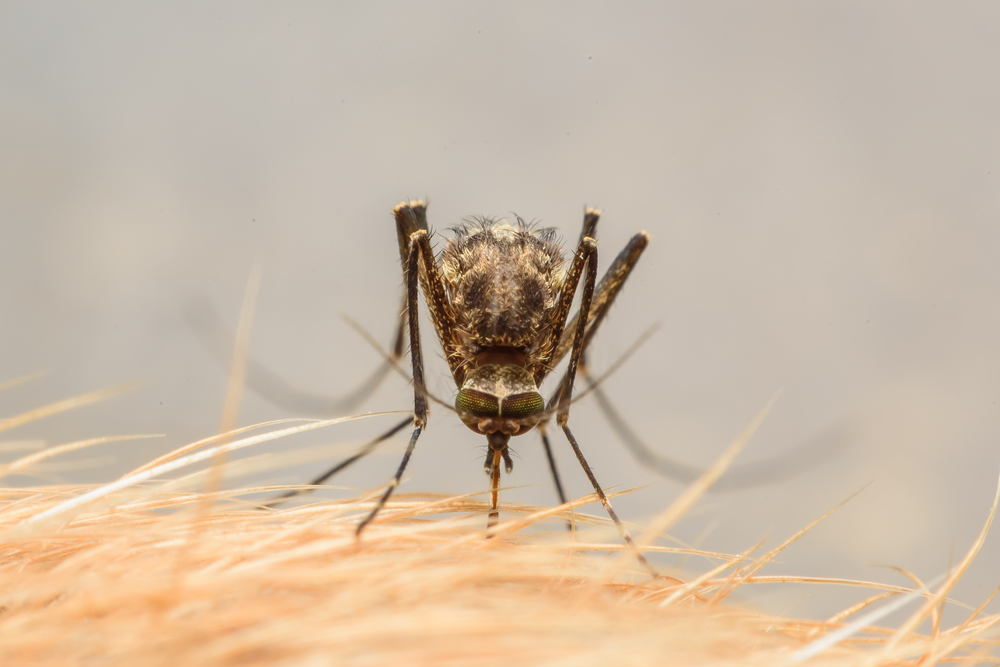When the weather heats up, the mosquitoes come out. In humans, these pests are not only annoying, but can also carry and transmit deadly diseases, such as malaria and West Nile virus. They can also threaten your pet’s health by transmitting heartworm infections that may go unnoticed until permanent damage has occurred. Preventive medications have made heartworm disease less common, but as long as mosquitoes lurk in the area, your pet is at risk for infection. Parker Center Animal Clinic takes heartworm disease seriously, and we know parasite control can be confusing, so we debunk common heartworm myths to help you better protect your pets from this serious, sometimes deadly threat.
Heartworm disease: The basics
First, let’s go through some heartworm basics.
- Transmission — Heartworms are carried by mosquitoes, and transmitted to pets when they bite. The mosquitoes pick up the immature worms from other infected pets or wild animals, most commonly canids like foxes, wolves, coyotes, and domestic dogs.
- Infection — The immature worms migrate through your pet’s blood stream to the heart and lungs, where they mature over six to seven months into foot-long adults and start to reproduce. Immature worms are then released into the bloodstream, where mosquitoes can pick them up to infect other animals.
- Disease — Heartworm infection eventually causes heartworm disease, which damages your pet’s heart, lungs, and associated blood vessels, and can cause coughing, difficulty breathing, heart failure, and eventually, death. In dogs, who are preferred hosts, heartworms live for several years, continuing to reproduce, increasing their numbers, and causing more severe infection. Cats host only a few worms at a time, but infection can still be deadly.
- Testing — Adult heartworms can be detected on a routine blood test. Positive tests are usually confirmed with repeat testing, followed by additional tests to look for immature worms in the blood and to assess heart and lung function. Heartworm-infected cats may not test positive, because only a couple of worms may be present, so additional tests are usually necessary.
- Treatment — Heartworm infection can be treated in dogs, but treatment is expensive and painful, takes several months, and requires absolute activity restriction. The treatment kills the worms, yet dogs often deal with irreversible heart and lung damage. No treatment is available for cats.
- Prevention — The best heartworm infection treatment is prevention. Some heartworm prevention medications are given monthly in an oral form, and some are given every six to 12 months in-hospital as an injectable form. Both forms are cost-effective, and readily available from your veterinarian. Preventives kill immature worms in certain stages, but can’t kill adults.
Heartworm disease: The myths
Now, let’s address some common myths about heartworm prevention to help you better protect your pet.
Myth: Regular deworming treatments take care of heartworms.
Fact: Deworming, which is the process of giving oral medication to reduce or eliminate common intestinal parasites, is routinely performed in young pets who are presumed to carry roundworms, and periodically in adults. Heartworms are resistant to standard deworming medications, so specialized heartworm preventives and treatments are necessary.
Myth: Heartworm preventives aren’t safe for all dog breeds.
Fact: Heartworm preventives contain low doses of special deworming medications that target immature heartworms. Some dog breeds, notably collies and similar herding breeds, have a gene mutation that makes them overly sensitive to multiple drugs, including those in heartworm preventives. However, studies show that these medications contain such low doses that they do not adversely affect these sensitive dogs, making preventives safe for all breeds.
Myth: Cats don’t need heartworm prevention.
Fact: Cats are considered a “dead-end” host, meaning heartworms can’t reproduce in this species. But, your feline friend can still become infected, typically hosting only a few adult worms that grow quite large in the cat’s small heart, damaging blood vessels and causing chronic respiratory disease, weight loss and vomiting, and sometimes, sudden death. Medications that kill heartworms in dogs aren’t safe for cats, so the only treatment course is supportive care for several years until the worms die on their own. Monthly preventives provide cats with the only protection against devastating heartworm disease.
Myth: Pets need heartworm prevention only during the warm months.
Fact: Heartworm preventives work retroactively—they kill immature heartworms that may have infected your pet in the month or so prior to treatment—so preventives must be continued well past the summer season. Mosquito activity can also be difficult to predict during the spring and fall weather transitions, and a single bite can infect your pet. Because we can’t predict exactly when your pet will be bitten, we recommend year-round preventives. Most preventives also contain medication that controls intestinal parasites, which can be picked up outdoors, from other pets, or from wildlife, and can harm children. So, ensure you protect your whole family by giving your pet heartworm preventives year-round.
Myth: My pet doesn’t need a heartworm test if they take a preventive year-round.

Fact: Heartworm testing is a complicated science. If preventives aren’t given correctly, the timing of a bite is exactly right, or mosquito loads are high, infection can still sneak through. Yearly testing is recommended for all dogs older than 7 months, but recommendations may differ if you acquire a new dog, have a lapse in prevention, or have a dog with a history of infection. Testing cats is trickier, and your veterinarian can determine the best regimen.
Most prevention medication manufacturers will guarantee their products if your pet tests positive for heartworm or other parasites they should be protected against, but you must meet certain requirements, such as proving you purchased the preventive from your veterinarian, you administer the product as directed each month, and you follow yearly testing recommendations.
Parker Center Animal Clinic can help with all your heartworm needs, from testing, to prevention, to treatment. Call us to schedule a visit if your pet is due for their wellness exam and heartworm test, or if you’d like to learn more about heartworm disease and prevention.






